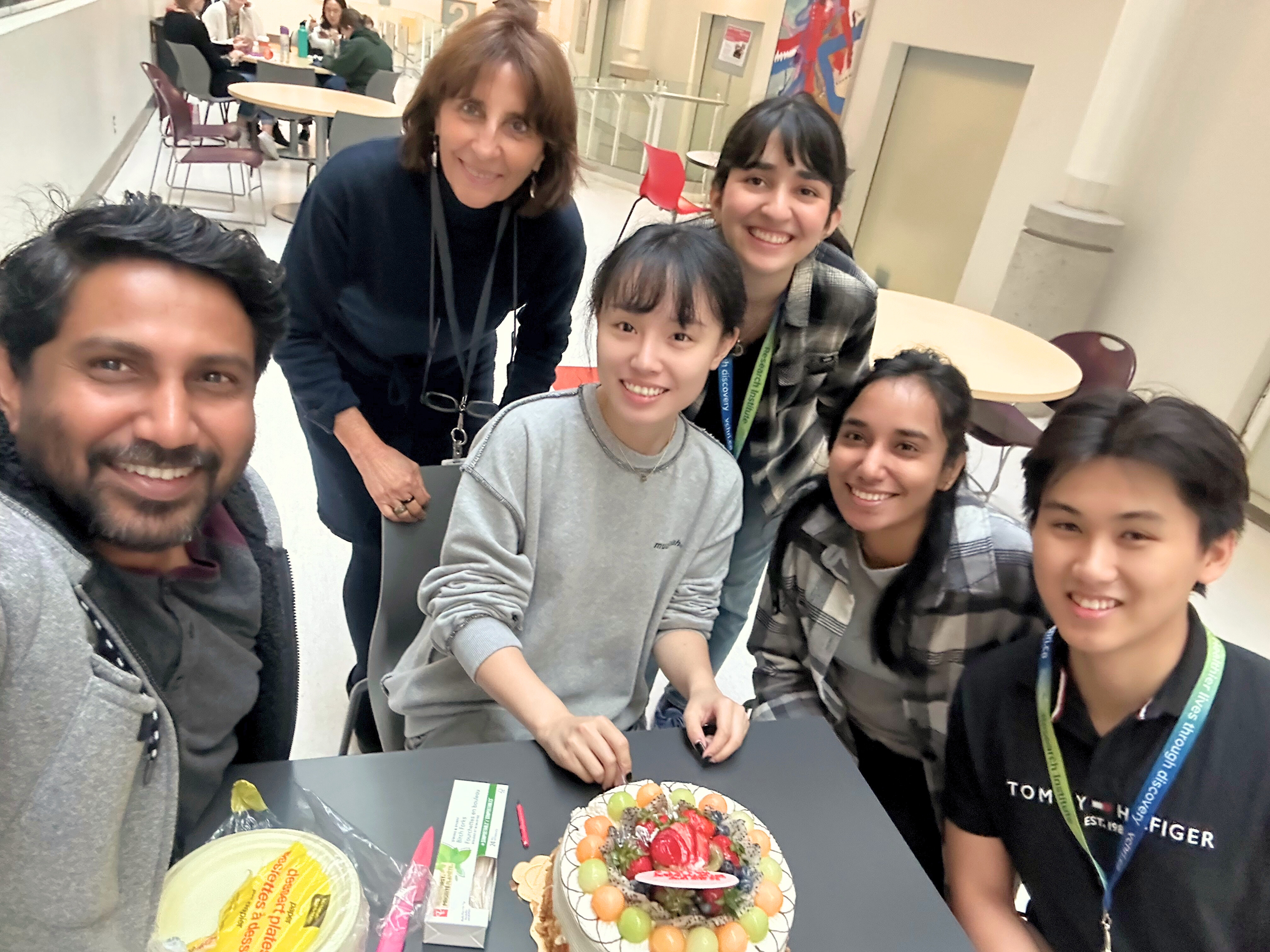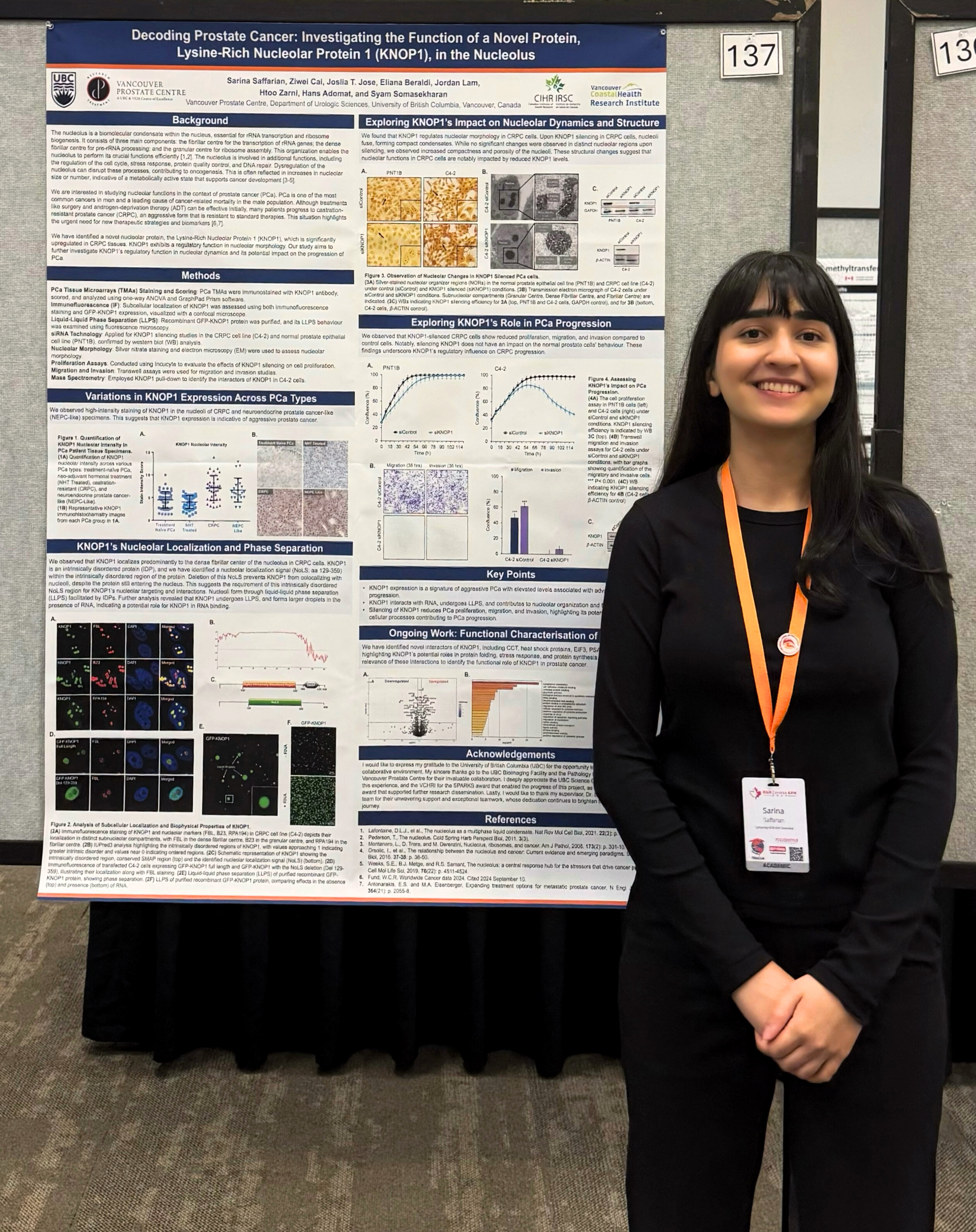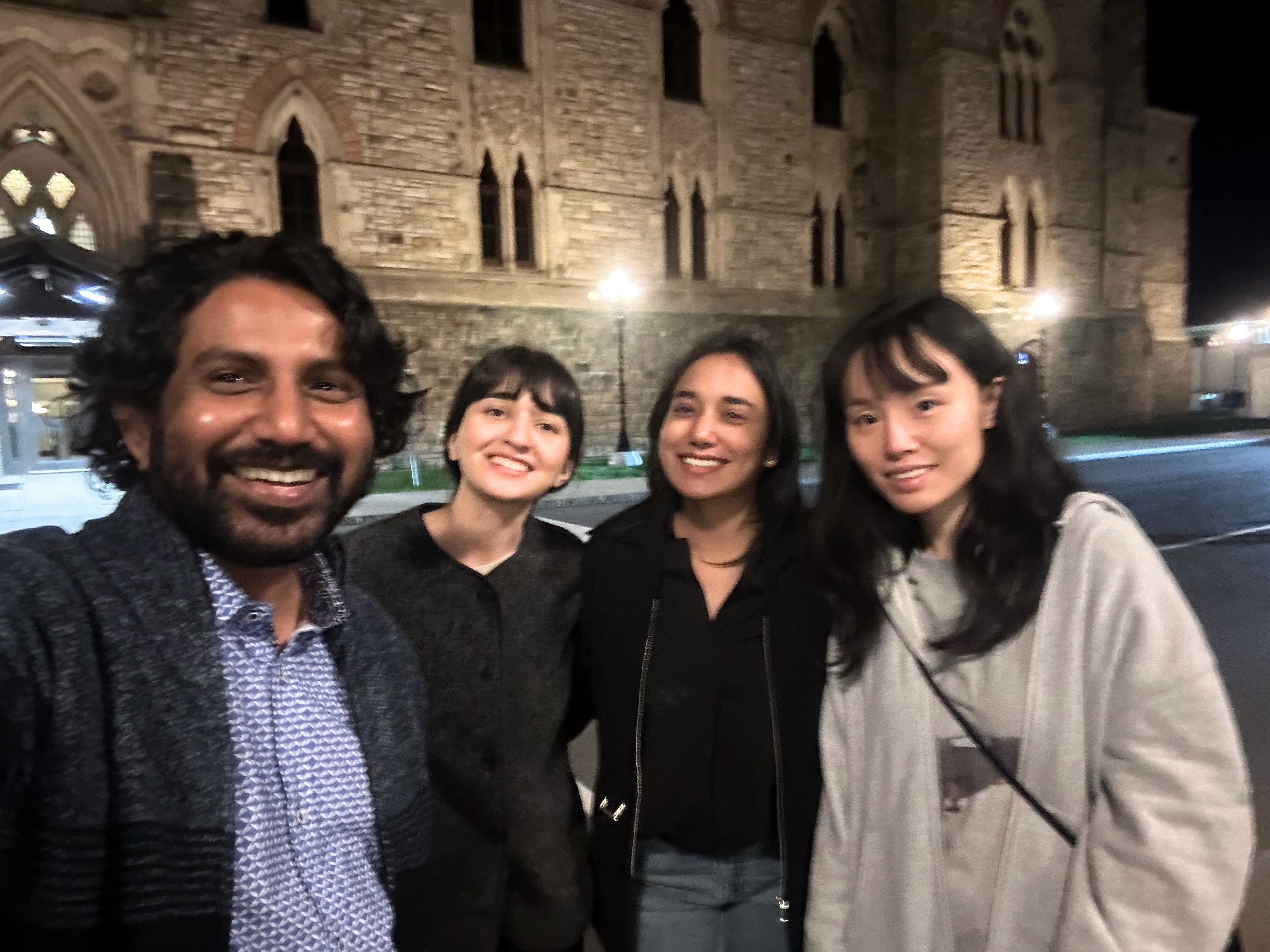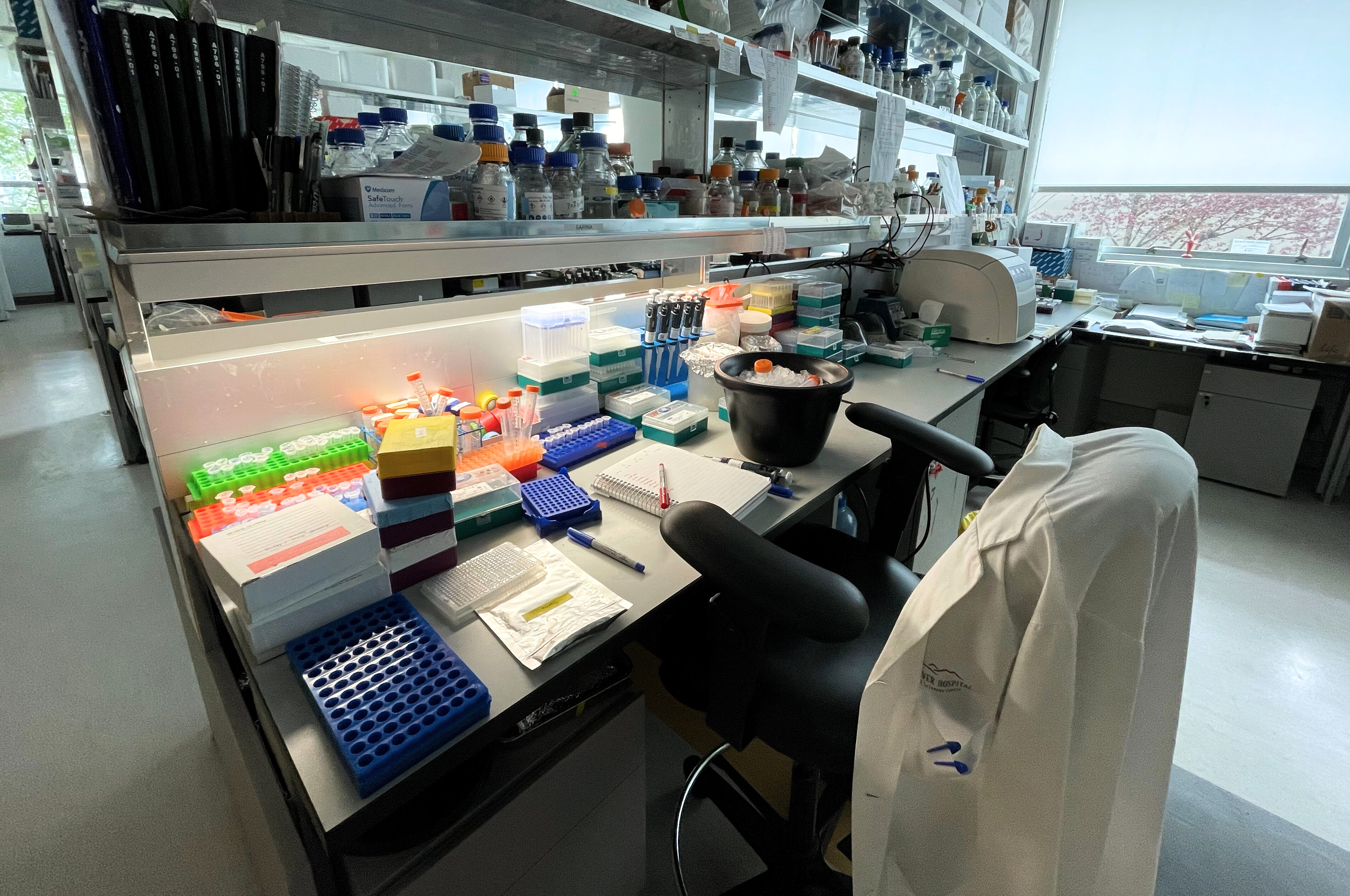Featured Student: Sarina Saffarian
February 20, 2025

February 20, 2025

I’m completing my undergraduate degree in BSc, majoring in Biology, and aim to graduate in Spring 2026.
I was very curious about how research can translate into solutions for real-world challenges.
After attending the Biology Info Session and learning about other students’ past experiences, I became interested in gaining practical experience through the opportunities in the research field that the Co-op program offered.
I opted for and worked one 16-month position as a Research Assistant at the Vancouver Prostate Centre (VPC) in Dr. Somasekharan's laboratory.
Becoming part of the VPC team has been a transformative journey.
I was immersed in innovative research within a collaborative setting, gaining valuable insights into research methods and discovering how, through teamwork, we can enhance our understanding of complex health issues, ultimately improving the quality of life.
Dr. Somasekharan’s lab focuses on interdisciplinary studies to explore how the molecular mechanisms of RNA regulation affect pathological conditions. A current research initiative in the lab examines nucleolar proteins and their involvement in tumour progression.
The nucleolus is a membrane-less biomolecular condensate within the nucleus of the cell. It’s a dynamic structure that can change its properties based on the interactions of its constituent molecules and cellular context. The nucleolus is essential for cellular homeostasis, with disruptions in its function linked to diseases, including cancer and neurodegeneration.
It comprises three separate regions, and its organized structure enables the nucleolus to efficiently manage its primary roles in rRNA synthesis and ribosome biogenesis. It also supports cellular functions, such as cell cycle regulation, stress response, protein quality control and DNA repair.
In cancer, nucleolar dysregulation typically manifests as either an increase in nucleolar size or their numbers. This change indicates a significantly active metabolic state that supports the heightened protein synthesis required by tumour cells.
Our lab is interested in studying prostate cancer (PCa), one of the most common cancers in the male population and a leading cause of cancer-related mortality. While treatments such as surgery and androgen deprivation therapy can initially control the disease, many patients eventually progress to castration-resistant prostate cancer (CRPC), an aggressive form of PCa that is resistant to standard treatments and has a poor survival rate. A potential link exists between nucleolar dysfunction and the progression of PCa. Specifically, nucleoli are enlarged and irregular in aggressive PCa compared to non-aggressive PCa.
Our team has discovered a notable connection between the enhanced translation of nucleolar proteins and resistance in CRPC. This relationship was established through findings that showed CRPC exhibits a marked increase in mRNA translation of nucleolar proteins compared to untreated PCa. These findings suggest that heightened nucleolar activity could be integral to CRPC's aggressive behaviour. I carried out projects focused on examining candidate proteins from highly translated nucleolar proteins in CRPC, aiming to gain insights into the mechanisms behind altered nucleolar activity in CRPC and ultimately informing therapeutic strategies targeting these mechanisms to disrupt cancer progression.
Our lab's multidisciplinary approach sparked my curiosity and created a rich environment for learning. Remaining in the same position throughout my 16-month Co-op program allowed my skills to take root and develop. This continuity offered me increased insight into long-term project development and a thorough understanding of the lab's activities and processes. I could take on more responsibilities, solve problems independently, and expand my participation in various aspects of the projects. This opportunity allowed me to begin an independent project while contributing to the lab's ongoing research. My project focused on characterizing the function of Lysine-Rich Nucleolar Protein 1 (KNOP1) in nucleolar dynamics and its potential impact on PCa progression using cell line models. I was honoured to receive the Vancouver Coastal Health Research Institute (VCHRI) Summer Program Advancing Research Knowledge and Skills (SPARKS) award, which allowed me to advance my project further. This experience was enjoyable, as it challenged me to think critically and apply what I have learned to explore new ideas.
What I truly liked about my Co-op placement was the viewpoint it offered by going beyond the textbook pages. Reading about fluorescence microscopy is captivating, but performing the technique yourself, looking at the illuminated cells under the fluorescence microscope in anticipation of unravelling the secrets they hold in the dark, is a different story.
My most enjoyable experiences while in Co-op could come down to the exhilarating "Aha!" moments when things fell into place after looking through the microscope or the curious instances of seeing unexpected results. However, there is an added richness to my Co-op experience that transcends the delight of acquiring knowledge… the people.

I appreciate having the chance to work with a diverse group of people, including our team and colleagues in other VPC labs. Along the way, I connected with many incredible individuals, learned from them, was inspired by them, built friendships and grew alongside them.
We discovered how KNOP1 localizes to a specific region of the nucleolus and appears crucial for maintaining nucleolar integrity in CRPC cells. When we silence KNOP1, CRPC cells show dramatic changes in nucleolar dynamics. The nucleoli fuse, adopting a round structure with enlarged cavities. We don’t observe these changes in the nucleoli of non-cancerous prostate cells upon silencing KNOP1.
These findings suggest that the observed increase in KNOP1 expression in CRPC might contribute to altered nucleolar dynamics, affecting functions in managing cellular stress and maintaining cellular homeostasis, ultimately leading to resistance to therapy. An additional important discovery is that silencing KNOP1 decreases the migration and invasion abilities of CRPC cells significantly, both of which are key traits of cancer progression. We have also identified novel protein interactors of KNOP1, hinting at its involvement in various cellular processes, such as stress response, ribosome biogenesis, antiviral defence, and cell growth.
Our lab is further investigating the mechanisms behind KNOP1’s identified interactions and its role in tumour progression. Understanding KNOP1’s functional role and interactions may provide valuable insights into therapeutic strategies aimed at targeting KNOP1 to disrupt its potential role in cancer progression.
I found the Introductory Molecular Biology (BIOL 341) course, which I took before my first Co-op term, to be invaluable in preparing me for my role as a research assistant. The course equipped me with practical lab skills, critical thinking and troubleshooting abilities that enhanced my research experience.
BIOL 341 planted the seed of scientific reasoning in my mind, whose roots grew deeper through my Co-op journey. I recommend this course to anyone looking to deepen their understanding of molecular biology and gain hands-on experience.
One of my favourite experiences was attending the RNA Canada ARN 2024 conference in Ottawa with our team. The event became a focal point where rays of discovery, networking and teamwork merged, revealing a vast horizon of possibilities.
The conference provided a meaningful knowledge exchange. I was amazed by the creative approaches and findings presented, especially in the field of translational research. I found immense value in opportunities like roundtable discussions with patients and clinicians, which broadened my perspective on real-world experiences that drive scientific inquiry.
Moreover, the conference created great networking opportunities, allowing us to interact with other trainees and mentors, which were both inspiring and informative.
It was genuinely rewarding to see the progress our team made together. I was grateful to receive the Canadian Institutes of Health Research (CIHR) Community Support (ICS) travel award alongside my fellow team members to attend the conference and present our lab's work.
It was a proud moment for our team, reflecting the strength of our teamwork and recognizing our unique contributions.
It was a proud moment for our team, reflecting the strength of our teamwork and recognizing our unique contributions. Watching my lab members showcase their efforts was heartwarming and I was excited to present my independent project through a poster presentation. I found communicating my research to be quite an enjoyable experience. I received constructive feedback and thought-provoking questions that unveiled new avenues for the project.

Our time in Ottawa allowed us to create lasting memories. Exploring the city and sharing those moments with my team members made the experience truly delightful.

Parliament Hill, Ottawa
A significant achievement from my Co-op experience is the development I gained in teamwork and adaptability.
Working closely with a team in a professional setting to achieve shared goals has given me valuable insight into team dynamics. I’ve become more attuned to different perspectives, learning to cultivate a collaborative spirit that enhances productivity and makes the work environment more rewarding.
Working closely with a team in a professional setting to achieve shared goals has given me valuable insight into team dynamics. I’ve become more attuned to different perspectives, learning to cultivate a collaborative spirit that enhances productivity and makes the work environment more rewarding.
Moreover, the exposure to complex research challenges has required me to adapt quickly to new information and evolving project needs, making me more resilient and open to change than before this experience.
When I started working as a research assistant, I noticed the gap between my existing knowledge/skills and the advanced techniques/concepts being explored in the lab.
It was challenging to grasp the many new concepts and techniques needed to perform experiments effectively. I tried to overcome this by viewing the challenge as an opportunity to learn and approach the work’s complexities with curiosity rather than fear.
I embraced the idea that it’s okay not to know everything, if I’m willing to try to learn. I discovered the importance of openly asking questions and seeking assistance as needed. Although support might not always be apparent, reaching out to others can uncover valuable resources that enhance learning. Taking the time to explore new concepts on my own was also crucial in navigating through this experience.
This challenge deepened my appreciation for lifelong learning. It made me realize how much I genuinely enjoy working in a field that continually challenges me to expand my knowledge and skills.
Co-op has contributed to my personal growth on many levels.
Gaining practical experience, navigating complex real-world challenges and applying what I learned to meaningful work as an integral team member have enriched my interpersonal skills and increased my self-awareness.
These experiences allowed me to better recognize my strengths and weaknesses outside the classroom. In addition, working in a dynamic lab environment enhanced my multitasking abilities and helped me become more proactive, instilling a strong sense of discipline.
I grew more comfortable stepping outside my comfort zone by embracing challenges during my Co-op, which encouraged me to tackle unfamiliar tasks, actively engage with professionals and voice my ideas—actions that I previously found difficult.
Thanks to my supportive colleagues, my Co-op experience enhanced my self-esteem and empowered me to pursue new opportunities with confidence, curiosity and openness.
My Co-op experience not only equipped me with valuable transferable skills such as teamwork, problem-solving, communication and adaptability, but also helped me clarify my values and learn how to find fulfillment in my work.
Throughout my enrollment in the program, I had the privilege of getting to know remarkable people and research groups, getting inspired by their journeys and their aspirations for creating a world of possibilities through their dedicated work.
I saw how we, as people, have the capacity to make meaningful contributions that can lead to positive change.
I saw how we, as people, have the capacity to make meaningful contributions that can lead to positive change. This encounter instilled a sense of optimism in me about the future career paths that lie ahead, encouraging me to pursue my aspirations with renewed enthusiasm, purpose and hope.
Reflecting on my Co-op journey, I am grateful for the Co-op teams’ support throughout the program.
My Co-op coordinator, Ellen Evangelista, provided the essential guidance and resources that I needed to navigate the program. Beyond being a reliable mentor, Ellen offered invaluable insights into personal and professional growth, along with personalized support that helped me develop my skills. I felt a great sense of comfort knowing that someone genuinely caring was there to support me, which positively influenced my experience. I also want to thank Elisa Jakhar, who helped me to arrange the interview that led to my Co-op placement.
The program's resources, including workshops on drafting tailored cover letters and resumes, as well as interview practice sessions, were invaluable in helping me develop essential professional skills. These resources equipped me with the tools to communicate my qualifications effectively in various settings and strengthened my confidence in navigating different professional landscapes.
A door may only open if you knock on it. Embrace the unknown and let go of the need to have all the answers before you knock. Apply for that exciting job opportunity you are unsure whether you qualify for. You will only know if you try.
A door may only open if you knock on it. Embrace the unknown and let go of the need to have all the answers before you knock. Apply for that exciting job opportunity you are unsure whether you qualify for. You will only know if you try.
Vast meadows rest beyond hills we dare to climb. Explore the grounds past your comfort zone. Take initiative in broadening your horizons, whether by exploring different placements or seeking new experiences within the same role. You may uncover a world of possibilities and find opportunities for growth in places you never expected.
The path to the mountaintop is a winding trail. Don't be discouraged when you face failure or when things don't go as planned. Have faith in your power to learn and grow and seek guidance from those who can support you. The way you choose to rise from falls shapes the foundation you stand on.
Lastly, remember that Co-op is a glimpse into the possibilities that live beyond your degree. Seize the moments of exploration!

This photo is a tribute to the bench that embraced moments of my exploration.
Life unfolds strangely at times – and this is perhaps the beauty of it.
I recently took a break from my studies due to unexpected circumstances, but I am now back to my studies and excited for the remainder of my undergraduate journey. I viewed this as an opportunity to prepare for the next steps, and I’ve returned with renewed enthusiasm to explore and learn. There are several courses I’ve been looking forward to taking, and I’m eager to delve into them.
I'm also curious about the future and eagerly anticipate opportunities after graduation. I look forward to furthering my education, growing as an individual, and meeting new people who will enrich my experience. I hope to cultivate meaningful connections and contribute to a brighter future for the people around me.

Canadian Museum of Nature, Ottawa
We honour xwməθkwəy̓ əm (Musqueam) on whose ancestral, unceded territory UBC Vancouver is situated. UBC Science is committed to building meaningful relationships with Indigenous peoples so we can advance Reconciliation and ensure traditional ways of knowing enrich our teaching and research.
Learn more: Musqueam First Nation